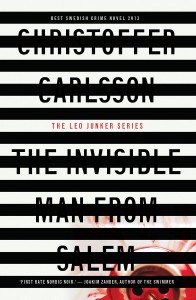 The Invisible Man from Salem by Christoffer Carlsson, published by Scribe Publications
The Invisible Man from Salem by Christoffer Carlsson, published by Scribe Publications
Pleasantville by Attica Locke, published by Serpent’s Tail UK, Harper US
Hush Hush by Laura Lippman, published by Faber & Faber UK, Wm Morrow US
Time of Death by Mark Billingham, published by Little, Brown UK, Atlantic Monthly US
Sleeping Dogs by Thomas Mogford, published by Bloomsbury UK and US
April may be the cruellest month, but April’s crime writers are a generous bunch, offering some of the best novels I have read this year. All of them deal, as good crime fiction must, with relationships: how to love, who to trust, who will betray you, and which of your circle you yourself will betray.
Christoffer Carlsson is the youngest ever winner of the Best Swedish Crime Novel of the year (2013), with a PhD in Criminology adding a high degree of credibility to his writing. The Invisible Man from Salem is a first-person narrative about Leo Junker, once a troubled teenager from a sink estate on the outskirts of Stockholm and now a disgraced police 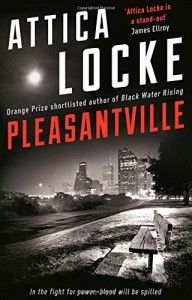 officer on suspension. The novel shifts between his adolescence, when he was falling in love for the first time and making friends with the even more troubled John Grimberg, and his current involvement with the murder of a drug-dealing prostitute in the hostel adjacent to where he is living out his suspension from work. The characterization, social and political background, psychology, and structure are all masterfully handled. Credit for the clean, involving language must be shared between the author and his translator, Michael Gallagher, who has done an excellent job: there is none of the woodenness or unlikely idiom that can make reading translated fiction like watching a film through distorting spectacles. The Invisible Man from Salem is one of the very few crime novels I have ever read that made me turn back to page one as soon as I had finished the last.
officer on suspension. The novel shifts between his adolescence, when he was falling in love for the first time and making friends with the even more troubled John Grimberg, and his current involvement with the murder of a drug-dealing prostitute in the hostel adjacent to where he is living out his suspension from work. The characterization, social and political background, psychology, and structure are all masterfully handled. Credit for the clean, involving language must be shared between the author and his translator, Michael Gallagher, who has done an excellent job: there is none of the woodenness or unlikely idiom that can make reading translated fiction like watching a film through distorting spectacles. The Invisible Man from Salem is one of the very few crime novels I have ever read that made me turn back to page one as soon as I had finished the last.
Attica Locke is another impressive writer with a sound grasp of the real background to her fiction. A screenwriter as well as a novelist, she has set Pleasantville in Texas in 1996, just after the start of Bill Clinton’s second term as president. Pleasantville is a community set up after the  Second World War for ‘Negro families of means and class’, and it has become what would be called a swing seat in the UK. The election at the heart of the novel is not a national one, but it is still important and will have implications way beyond the local area. Hoping to become Pleasantville’s first black mayor is the local police chief, whose father founded the community and still wields considerable power. The fire and conviction of the civil rights movement are only memories now, and various interested parties are prepared to get their hands very dirty in the political fight that is under way. In 2009 Locke herself supported her father’s campaign to be mayor and her experience then informs this powerful novel.
Second World War for ‘Negro families of means and class’, and it has become what would be called a swing seat in the UK. The election at the heart of the novel is not a national one, but it is still important and will have implications way beyond the local area. Hoping to become Pleasantville’s first black mayor is the local police chief, whose father founded the community and still wields considerable power. The fire and conviction of the civil rights movement are only memories now, and various interested parties are prepared to get their hands very dirty in the political fight that is under way. In 2009 Locke herself supported her father’s campaign to be mayor and her experience then informs this powerful novel.
Her hero, who also featured in her highly regarded first novel Black Water Rising, is lawyer Jay Porter. Now that his wife has died of cancer, he is the harassed lone parent of 15-year-old Ellie and her younger brother, Ben. Some years ago Jay won a class action against a polluting chemical company, but the money awarded by the court has not yet been paid and his clients are getting restive. He cannot bear the thought 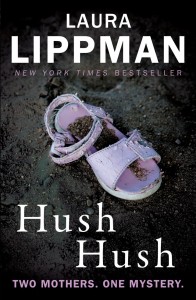 of going into court again, resenting the time spent away from his wife’s bedside on the case. But when the potential mayor’s nephew is arrested and charged with the murder of a young girl, loyalty and need force him back into court.
of going into court again, resenting the time spent away from his wife’s bedside on the case. But when the potential mayor’s nephew is arrested and charged with the murder of a young girl, loyalty and need force him back into court.
Locke writes vivid, hard-hitting prose and has the talent to make the political side of her novel as gripping as the conflicting personal loyalties. Pleasantville is a shocking exposition of the legal and political systems in America and a moving and engrossing exploration of some of the most difficult human relationships – between parents and children.
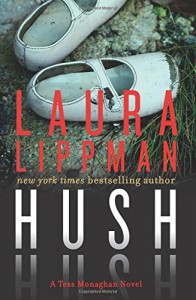 Laura Lippman journeys through some of the same territory in Hush Hush, dealing with appealing frankness about the day-to-day boredom and misery of motherhood. Her continuing character Tess Monaghan, journalist and private investigator, is devoted to her three-year-old daughter, Carla Scout, but often driven to agonies of frustration by her. This makes Tess more than ambivalent about her latest client, Melisandre Dawes, who left her baby to die in a boiling hot car but avoided a murder conviction on the grounds of insanity. As Melisandre, a lawyer by training, says: ‘I’m every woman’s worst nightmare… because whenever a woman kills her child every other mother… has a flash of sympathy.’ Tess has been retained to provide security for her while she prepares a filmed documentary about the case. Facets of the background to the crime are given in verbatim interview sessions between witnesses and the director of the film, in Tess’s discoveries, and in scenes between Melisandre’s two surviving daughters, who are now in their teens.
Laura Lippman journeys through some of the same territory in Hush Hush, dealing with appealing frankness about the day-to-day boredom and misery of motherhood. Her continuing character Tess Monaghan, journalist and private investigator, is devoted to her three-year-old daughter, Carla Scout, but often driven to agonies of frustration by her. This makes Tess more than ambivalent about her latest client, Melisandre Dawes, who left her baby to die in a boiling hot car but avoided a murder conviction on the grounds of insanity. As Melisandre, a lawyer by training, says: ‘I’m every woman’s worst nightmare… because whenever a woman kills her child every other mother… has a flash of sympathy.’ Tess has been retained to provide security for her while she prepares a filmed documentary about the case. Facets of the background to the crime are given in verbatim interview sessions between witnesses and the director of the film, in Tess’s discoveries, and in scenes between Melisandre’s two surviving daughters, who are now in their teens.
Lippman has always had interesting things to write about sisters, and this novel is no exception. But most of it is about mothers: public perception of their obligations and failings, as well as their efforts to balance their own needs and those of their children, without forgetting their partners in the daily battle. Such painful material could be depressing to read, but Tess is such an engaging character – full of contradictory drives, chaotic domestic habits, and tremendous warmth – and the Baltimore background is so affectionately portrayed that Hush Hush provides plenty of pleasure.
Mark Billingham also deals with parents and children, as well as with the difficulty of finding a way to love, in his latest novel about Detective Inspector Tom Thorne. Time of 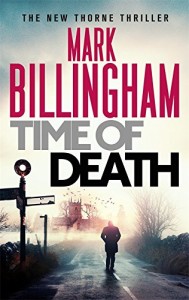 Death sees him and his lover, Helen, embarking on a Valentine’s weekend in the Cotswolds, when news of an arrest in a long-running abduction case interrupts their romantic interlude. The arrest has happened in the market town where Helen grew up and she was at school with the main suspect’s wife. She insists that they travel north to support her old friend. Puzzled by what can be driving Helen to intervene when she has never mentioned this friend or wanted to return to her roots, Thorne himself soon becomes involved in the investigation into the young girls’ disappearance. He wants to love Helen but doesn’t understand her and doesn’t really know how to love. His easiest relationship is with his old
Death sees him and his lover, Helen, embarking on a Valentine’s weekend in the Cotswolds, when news of an arrest in a long-running abduction case interrupts their romantic interlude. The arrest has happened in the market town where Helen grew up and she was at school with the main suspect’s wife. She insists that they travel north to support her old friend. Puzzled by what can be driving Helen to intervene when she has never mentioned this friend or wanted to return to her roots, Thorne himself soon becomes involved in the investigation into the young girls’ disappearance. He wants to love Helen but doesn’t understand her and doesn’t really know how to love. His easiest relationship is with his old 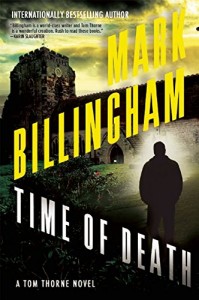 friend Hendricks, the exotically pierced and tattooed pathologist, who is also brought in to the case. The most touching moment in a novel full of variously painful relationships comes when Hendricks, gay and commitment-phobic, rediscovers tenderness. Time of Death is, unsurprisingly, an effective detective novel, but it is also an exploration of male love and friendship.
friend Hendricks, the exotically pierced and tattooed pathologist, who is also brought in to the case. The most touching moment in a novel full of variously painful relationships comes when Hendricks, gay and commitment-phobic, rediscovers tenderness. Time of Death is, unsurprisingly, an effective detective novel, but it is also an exploration of male love and friendship.
Thomas Mogford is another writer with an interesting take on men and their search for love. His detective is Spike Sanguinetti, a Gibraltarian lawyer, who was introduced to the public in Shadow ofthe Rock. Unmarried, with tragic love affairs behind him, responsibility for an increasingly demented father and an orphaned boy, Sanguinetti is a highly attractive character. In Sleeping Dogs he and his father are taking a holiday with his business partner in Corfu, and the novel is full of ravishing views, delectable food and punishing retsina. The action takes Spike and his latest love interest over to the Albanian mainland, where organized crime and tribal vendetta ratchet up the narrative tension. Intelligently written and witty, Sleeping Dogs would be perfect reading on a terrace above the Ionian sea, surrounded by the scent of wild thyme, and with a dewy glass of 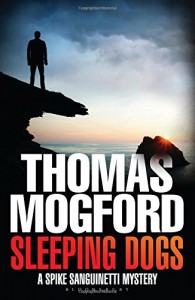 ice-cold fizz at your side.
ice-cold fizz at your side.
